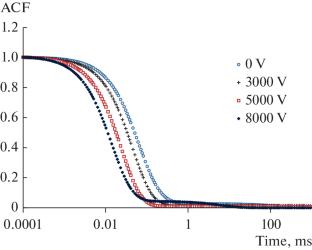利用动态光散射研究磁性流体中的电对流
IF 0.48
Q4 Physics and Astronomy
Bulletin of the Russian Academy of Sciences: Physics
Pub Date : 2024-10-29
DOI:10.1134/S1062873824707840
引用次数: 0
摘要
使用动态光散射方法对煤油基磁性流体中的电对流进行了实验研究。发现在不同的电压和电极间距离下,自相关函数的弛豫时间都会缩短。根据实验数据,确定了混沌电对流的最大速度与电极电压和电极间距离的关系。本文章由计算机程序翻译,如有差异,请以英文原文为准。

Study of Electroconvection in Magnetic Fluids by Dynamic Light Scattering
Electroconvection in kerosene-based magnetic fluids was experimentally studied using the method of dynamic light scattering. A decrease in the relaxation time of the autocorrelation function was discovered at various voltages and interelectrode distances. Based on experimental data, the dependences of the maximum velocity of chaotic electroconvective flows on the voltage on the electrodes and the distance between them were determined.
求助全文
通过发布文献求助,成功后即可免费获取论文全文。
去求助
来源期刊

Bulletin of the Russian Academy of Sciences: Physics
Physics and Astronomy-Physics and Astronomy (all)
CiteScore
0.90
自引率
0.00%
发文量
251
期刊介绍:
Bulletin of the Russian Academy of Sciences: Physics is an international peer reviewed journal published with the participation of the Russian Academy of Sciences. It presents full-text articles (regular, letters to the editor, reviews) with the most recent results in miscellaneous fields of physics and astronomy: nuclear physics, cosmic rays, condensed matter physics, plasma physics, optics and photonics, nanotechnologies, solar and astrophysics, physical applications in material sciences, life sciences, etc. Bulletin of the Russian Academy of Sciences: Physics focuses on the most relevant multidisciplinary topics in natural sciences, both fundamental and applied. Manuscripts can be submitted in Russian and English languages and are subject to peer review. Accepted articles are usually combined in thematic issues on certain topics according to the journal editorial policy. Authors featured in the journal represent renowned scientific laboratories and institutes from different countries, including large international collaborations. There are globally recognized researchers among the authors: Nobel laureates and recipients of other awards, and members of national academies of sciences and international scientific societies.
 求助内容:
求助内容: 应助结果提醒方式:
应助结果提醒方式:


